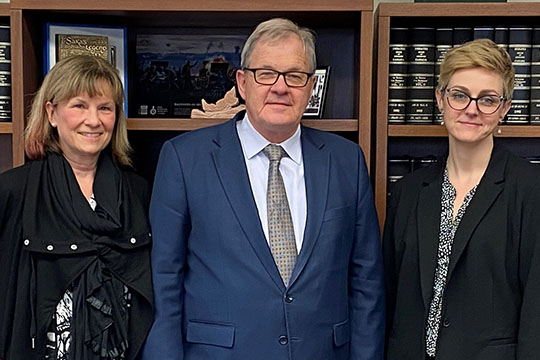
From left to right, Federal Retirees member and veteran, Dr. Karen Breeck; Minister of Veterans Affairs and Associate Minister of National Defence, Lawrence MacAulay; Federal Retirees director of advocacy, Sayward Montague.
Earlier this month, Federal Retirees CEO Simon Coakeley and Advocacy Director Sayward Montague, along with member and veteran Dr. Karen Breeck MD, met with Minister Lawrence MacAulay and his staff to discuss challenges facing veterans, and particularly women veterans.
Challenges facing women veterans
Women presently comprise approximately 16 per cent of the military, and Canada aims to increase that to 25 per cent, or one in four military personnel, by 2026. As women continue to be preferentially recruited into the military, more women will unfortunately also be at risk for workplace injuries and illnesses that can result in their medical release, leading women to become a growing source of Veterans Affairs Canada’s clients.
“Women have only been working in all the previously male-only military jobs and roles for just over thirty years – that’s only one career length ago. The military and veterans affairs approaches to medical care and supports were set up originally for men, to support men. When women were ‘added’ into the mix in large numbers, the system was largely left gender-blind for its research, policy and benefit approaches and considerations,” says Dr. Breeck.
She further explains that “about 80 per cent of the time treating men and women equally is okay. However, about 20 per cent of the time, medically speaking, treating women like they are men is not okay. Women need biological sex specific considerations for how their military service-related experiences and exposures impact their health and well-being. To ensure equitable care for all veterans will require the military and veterans affairs systems to develop an action plan to identify and address areas that have not yet been researched adequately, addressed equitably, or in some cases addressed at all for military women.”
WREN in action
Federal Retirees believes it’s now time for that action and has shared several recommendations with Minister MacAulay and his staff. Coakeley, who had a long career in the federal public service as an executive prior to joining Federal Retirees, understands Veterans Affairs Canada. He served in the past as the department’s Chief Pensions Advocate.
“We were delighted to have the opportunity to share with Minister MacAulay that Federal Retirees is working closely with Dr. Breeck and others on the Women Veteran Research and Engagement Network, or WREN,” says Coakeley. “Together, we’re recommending the government urgently ensures sex and gender-based analyses are done comprehensively and consistently, and that this be a well-funded priority.”
Joining forces in October 2019, WREN members include civilian subject matter experts, academics, researchers, non-governmental organizations and veterans with lived experience. Together WREN leverages its collective knowledge and expertise to scientifically amplify and advocate for the needs unique to military women to government.
WREN's mission is to ensure equitable lifetime outcomes for all veterans in the seven domains of well-being as defined by the Government of Canada. Members of WREN support and promote the government's use of sex- and gender-informed, evidence-based policies and practices in defence and security to help identify when and where inequities continue to exist.
Next steps
Veterans Affairs Canada has already started to take some important steps toward ensuring the equitable health outcomes for women veterans, and the Federal Retirees team congratulated the Minister on those steps. Last May, the first Veteran Women’s Forum was held in PEI, and plans are underway to ensure the forum becomes an annual feature and effective vehicle to move these policy issues forward for the benefit of both serving and veteran women. In 2019, the department established the Office of Women, which has since been re-named the Office for Women and LGBTQ2 Veterans.
“Veterans often advocate for wanting one common standard to ensure every veteran is treated equally. However, there are times when treating veterans equally will systemically benefit some, while hurting others. What I think veterans really want to be advocating for is fairness and equitable outcomes for all,” noted Dr. Breeck.
In addition to his critical role as minister of Veterans Affairs, Minister MacAulay is also the associate minister of National Defence. For this reason, the Federal Retirees team was also able to discuss the ways in which many of the challenges women veterans face actually began further upstream – during their years of service with the Canadian Armed Forces. The veterans affairs minister’s ability to bring any “downstream” lessons learned from the veteran community directly to the Department of National Defence that could serve to improve the health and wellbeing of today’s soldiers, women or men, is a very important one.
The Minister and his team heard and were receptive to all the concerns and recommendations expressed by the Federal Retirees team.
“Federal Retirees is committed to working with government to ensure all veterans have a successful transition into civilian life, when that time comes,” noted Coakeley. “That means ensuring new approaches and resources are put in place to address gaps that have existed far too long for women who have served and are still serving Canada.”

